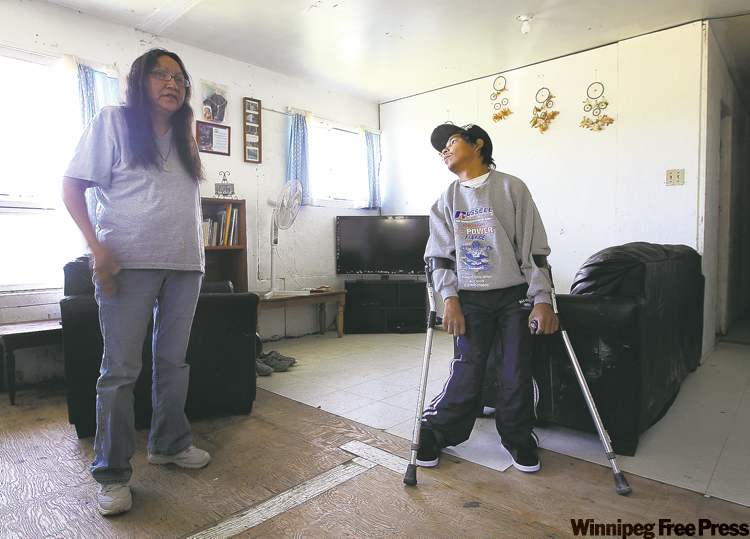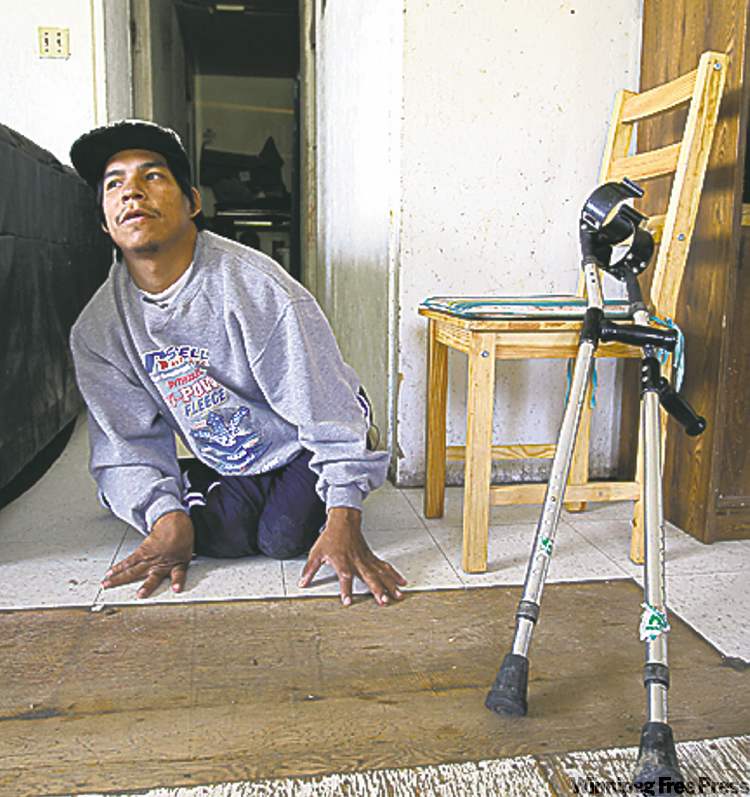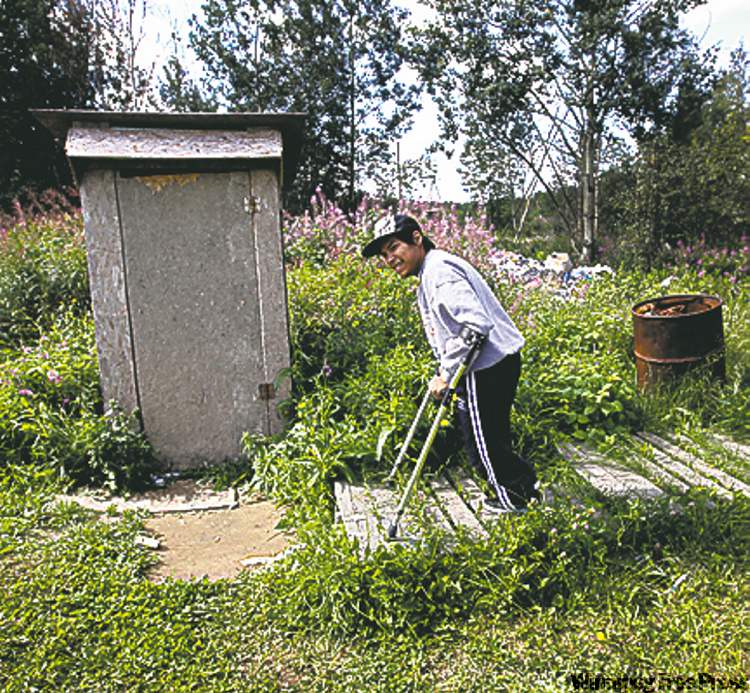Degrading third-world conditions one more hurdle for disabled man on reserve
No running water
Advertisement
Read this article for free:
or
Already have an account? Log in here »
To continue reading, please subscribe:
Monthly Digital Subscription
$0 for the first 4 weeks*
- Enjoy unlimited reading on winnipegfreepress.com
- Read the E-Edition, our digital replica newspaper
- Access News Break, our award-winning app
- Play interactive puzzles
*No charge for 4 weeks then price increases to the regular rate of $19.00 plus GST every four weeks. Offer available to new and qualified returning subscribers only. Cancel any time.
Monthly Digital Subscription
$4.75/week*
- Enjoy unlimited reading on winnipegfreepress.com
- Read the E-Edition, our digital replica newspaper
- Access News Break, our award-winning app
- Play interactive puzzles
*Billed as $19 plus GST every four weeks. Cancel any time.
To continue reading, please subscribe:
Add Free Press access to your Brandon Sun subscription for only an additional
$1 for the first 4 weeks*
*Your next subscription payment will increase by $1.00 and you will be charged $16.99 plus GST for four weeks. After four weeks, your payment will increase to $23.99 plus GST every four weeks.
Read unlimited articles for free today:
or
Already have an account? Log in here »
Hey there, time traveller!
This article was published 22/10/2011 (5165 days ago), so information in it may no longer be current.
ST. THERESA POINT — A little whistle means Kevin Taylor has managed to hoist himself over the slop pail by himself and doesn’t need his mother’s help.
Taylor, a shy 30-year-old who has cerebral palsy and can’t walk on his own, has a few bathroom options in his St. Theresa Point home, and they’re all a humiliating hassle.
He can use his crutches to get from his perch on the living room sofa to the small room that serves as the bathroom. That’s where the new slop pail is parked under the chair-like commode, near the plastic basin that serves as a makeshift sink. If Taylor’s in a hurry, though, he usually drags his body down the hall in a scooching motion he’s perfected and heaves himself up onto the commode.

"If he goes in a hurry, he crawls there. He doesn’t have time to grab his crutches because his crutches slow him down," his mother Alice said. "I say ‘Kevin are you OK?’ and he will whistle away. That means he’s OK."
If it’s summer, Taylor can make a tortuous trip out to the biffy. Positioning his crutches carefully on the sinking wooden palettes that make a path, Taylor inches past the home’s garbage pile, where the family dumps their slop pail.
The Taylors are among 300 families in St. Theresa Point without any running water — no sewer lines or water pipes, no cistern, no toilet, no bath, no kitchen sink.
That doesn’t take into account the reserve’s dramatic housing shortage that jams a dozen or more people into small two- or three-bedroom bungalows, forcing people to sleep on old couches or mattresses strewn on the floor. The band estimates it needs another 900 homes to give residents the kind of space most Winnipeggers enjoy.
Chief David McDougall doesn’t believe, at the rate things are going, that he’ll see his community fully serviced by water and sewers in his lifetime.
"I don’t think so, the way things are happening," he said from the band office. "The population rate is exploding now… It would be very ambitious to say we can do it in 20 or 25 years."
Despite Taylor’s disability and his parents’ rapidly advancing age, the family is not on the band’s priority list for running water, which highlights just how long that list is. This summer, the band had enough funding to build 18 new homes and retrofit 11, giving them running water, proper toilets and kitchen sinks. The Taylors didn’t get a nibble, even though all their neighbours have piped water so the main line must run right past their living room.
The truth is, compared to many families who live on reserve, this family gets on pretty well despite Taylor’s challenges. Taylor rarely gets sick with the kind of skin or stomach ailments that often plague people without proper sanitation. The home is rundown, the walls are a little dirty and the linoleum flooring is peeling. But it’s tidy and uncluttered, with a laminated Ten Commandments posted on the wall and a shrine to St. Theresa on a corner shelf.
And Alice Taylor has chosen to focus her considerable energy on getting help for her son, not necessarily demanding running water, though a sink and a toilet would be a godsend.

brightcove.createExperiences();
The Taylors have filed a federal human rights complaint about the almost total lack of programs for disabled people on reserve. There is no physio or speech therapy, no work- or life-skills programs and no respite for the family. Taylor spends most of his day watching television and doing word-search puzzles when Alice knows he is capable of much more.
"I’m fighting for him to stay on the reserve instead of going out to some institution," Alice said. "I’d like the services to come to him, because I know there are services that are available, so he can stay with his siblings and local people that he knows, so he doesn’t have to go to some other place, like in the city."
Ironically, the family’s lack of basic sanitation is also Taylor’s social salvation. Once a week, he’s picked up by home-care workers and taken to the bright new nursing station for a bath. It’s one of his few outings, except an occasional trip to church.
All week he counts the sleeps until his Monday bath. Once, Alice told him it was two more sleeps, and Taylor took two naps that day, hoping those counted.
On reserves where mud roads and soggy yards are the norm, it’s difficult to stay clean. The interior of every truck is caked with grit and gravel. Before entering any office or home, everyone removes their shoes, leaving a pile of mud-clotted sneakers or Crocs on soggy pieces of cardboard at the door. Even so, the floors in many homes are smeared with dirt, the walls scuffed or scribbled upon.
Kids who play outside get dirty almost immediately, and they often stay that way since most homes don’t have showers or washing machines.
It’s a particular challenge for Kevin Taylor, whose shoes wear out quickly because of the way he drags his feet, and whose track pants often get pretty grubby when he’s scooching across the floor.
Kevin washes his face in a plastic basin just like everyone else in the house, and Alice gives him frequent sponge baths. But it’s getting harder for her and her husband to cope as they get older.

"I know I can’t handle him anymore," she says. "We try to keep him clean. I do his laundry. I use rainwater in summer as much as we can. If we have a vehicle running, we can get water from the pumps."
In winter, the family melts snow for washing. Getting clean drinking water means a drive to the communal pumps, which often freeze in the winter.
Over the summer, the federal government spent $1 million in Island Lake on new, 170-litre water barrels that can be filled up by water trucks.
Ottawa also sent 1,000 new slop pails for use as indoor toilets, complete with toilet seats for added comfort. Those were distributed among the four Island Lake bands, and many saw them as an insult. Instead of dealing with the larger demand of new water pipes and real indoor toilets, Ottawa perpetuated Third World conditions. It was a solution one chief called "archaic and degrading" and it fell well short of the $8 million in emergency funding the Island Lake chiefs requested. They hoped to build central shower and laundry facilities and buy two dozen more water and sewage trucks able to deliver water and haul away human waste.
But Alice Taylor got both a new slop pail and a big water tank, and said they actually improved her situation, especially the water tank, which the family put under the eaves to catch rainwater.
"If we had running water, it would be so helpful," Alice said. "He could bathe himself, and we wouldn’t have to limit our water for washing and drinking."
maryagnes.welch@freepress.mb.ca
History
Updated on Saturday, October 22, 2011 9:51 AM CDT: adds video



